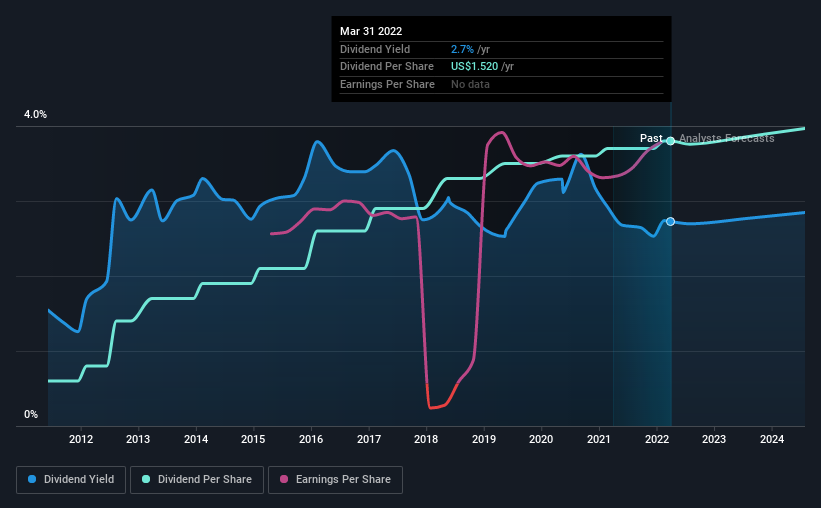Cisco Systems, Inc. (NASDAQ:CSCO) Stock Goes Ex-Dividend In Just Three Days
Cisco Systems, Inc. (NASDAQ:CSCO) is about to trade ex-dividend in the next 3 days. Typically, the ex-dividend date is one business day before the record date which is the date on which a company determines the shareholders eligible to receive a dividend. The ex-dividend date is important as the process of settlement involves two full business days. So if you miss that date, you would not show up on the company's books on the record date. Meaning, you will need to purchase Cisco Systems' shares before the 5th of April to receive the dividend, which will be paid on the 27th of April.
The company's upcoming dividend is US$0.38 a share, following on from the last 12 months, when the company distributed a total of US$1.52 per share to shareholders. Based on the last year's worth of payments, Cisco Systems stock has a trailing yield of around 2.7% on the current share price of $55.75. We love seeing companies pay a dividend, but it's also important to be sure that laying the golden eggs isn't going to kill our golden goose! As a result, readers should always check whether Cisco Systems has been able to grow its dividends, or if the dividend might be cut.
View our latest analysis for Cisco Systems
If a company pays out more in dividends than it earned, then the dividend might become unsustainable - hardly an ideal situation. Cisco Systems paid out more than half (53%) of its earnings last year, which is a regular payout ratio for most companies. A useful secondary check can be to evaluate whether Cisco Systems generated enough free cash flow to afford its dividend. Fortunately, it paid out only 45% of its free cash flow in the past year.
It's positive to see that Cisco Systems's dividend is covered by both profits and cash flow, since this is generally a sign that the dividend is sustainable, and a lower payout ratio usually suggests a greater margin of safety before the dividend gets cut.
Click here to see the company's payout ratio, plus analyst estimates of its future dividends.
Have Earnings And Dividends Been Growing?
Companies with consistently growing earnings per share generally make the best dividend stocks, as they usually find it easier to grow dividends per share. If earnings decline and the company is forced to cut its dividend, investors could watch the value of their investment go up in smoke. With that in mind, we're encouraged by the steady growth at Cisco Systems, with earnings per share up 6.0% on average over the last five years. While earnings have been growing at a credible rate, the company is paying out a majority of its earnings to shareholders. Therefore it's unlikely that the company will be able to reinvest heavily in its business, which could presage slower growth in the future.
Many investors will assess a company's dividend performance by evaluating how much the dividend payments have changed over time. Cisco Systems has delivered an average of 20% per year annual increase in its dividend, based on the past 10 years of dividend payments. It's encouraging to see the company lifting dividends while earnings are growing, suggesting at least some corporate interest in rewarding shareholders.
Final Takeaway
From a dividend perspective, should investors buy or avoid Cisco Systems? While earnings per share growth has been modest, Cisco Systems's dividend payouts are around an average level; without a sharp change in earnings we feel that the dividend is likely somewhat sustainable. Pleasingly the company paid out a conservatively low percentage of its free cash flow. To summarise, Cisco Systems looks okay on this analysis, although it doesn't appear a stand-out opportunity.
Ever wonder what the future holds for Cisco Systems? See what the 26 analysts we track are forecasting, with this visualisation of its historical and future estimated earnings and cash flow
A common investing mistake is buying the first interesting stock you see. Here you can find a full list of high-yield dividend stocks.
Have feedback on this article? Concerned about the content? Get in touch with us directly. Alternatively, email editorial-team (at) simplywallst.com.
This article by Simply Wall St is general in nature. We provide commentary based on historical data and analyst forecasts only using an unbiased methodology and our articles are not intended to be financial advice. It does not constitute a recommendation to buy or sell any stock, and does not take account of your objectives, or your financial situation. We aim to bring you long-term focused analysis driven by fundamental data. Note that our analysis may not factor in the latest price-sensitive company announcements or qualitative material. Simply Wall St has no position in any stocks mentioned.

 Yahoo Movies
Yahoo Movies 

